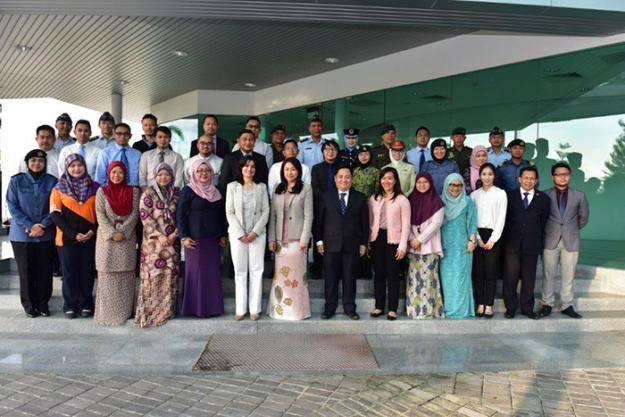
Participants at National Awareness-Raising and Legislative Assistance Workshop, in Bandar Seri Begawan, Brunei
THE HAGUE, Netherlands – 17 April 2018 – Brunei Darussalam made further progress in its implementation of the Chemical Weapons Convention (CWC) by creating a plan to establish a National Authority and draft implementing legislation on the Convention, during a National Awareness-Raising and Legislative Assistance Workshop, held from 11-12 April in Bandar Seri Begawan, Brunei.
The event was organised by the Ministry of Defence of Brunei and the Organisation for the Prohibition of Chemical Weapons (OPCW).
Director of Defence Policy of the Ministry of Defence, Mr Haji Adi Ihram bin Dato Paduka Haji Mahmud, highlighted that the workshop “is part of an ongoing effort to equip the Government Ministries, industries and other relevant stakeholders with the requisite know-how to enable Brunei Darussalam to effectively implement its obligations under the CWC.”
During the workshop, Brunei ministerial officials and industry representatives were given an overview of the CWC and the work of the OPCW, the role of the National Authority in implementing the Convention, and the relevance of implementing legislation on the CWC in addressing current and emerging security threats. Participants engaged in practical exercises and discussed case studies on the application of the CWC.
The workshop resulted in an action plan on the creation of the National Authority of Brunei and finalisation of its national CWC implementing legislation. They also identified declarable activities in trade of scheduled chemicals, and made a commitment for the relevant bodies to start implementing them.
The Guest of Honour, Permanent Secretary of the Ministry of Foreign Affairs and Trade, Ms Datin Paduka Tan Bee Yong, underlined in her closing remarks OPCW’s role in building the capacity of local experts to ensure effective measures to address risks from the use of chemical weapons.
In attendance were over 50 representatives from the Attorney General’s Chambers of the Prime Minister’s Office; Royal Customs and Excise Department of the Ministry of Finance; Directorates and Units of the Ministry of Defence and Royal Brunei Armed Forces (RBAF); Ministry of Foreign Affairs and Trade; Fire and Rescue Department of the Ministry of Home Affairs; Ministry of Education; Ministry of Development; Ministry of Health; Energy and Industry Department; and the energy company Total E&P Borneo.
Background
The workshop was co-organised by OPCW Technical Secretariat’s Implementation Support Branch (IPB) that facilitates a number of programs aimed at assisting States Parties in developing and adopting implementing legislation on the Chemical Weapons Convention, including legal workshops, the Internship Programme for Legal Drafters and National Authority representatives, and the review of the texts of draft legislation that are submitted to the Technical Secretariat for comments.
As the implementing body for the Chemical Weapons Convention, the OPCW oversees the global endeavour to permanently eliminate chemical weapons. Since the Convention’s entry into force in 1997 – with its 192 States Parties – it is the most successful disarmament treaty eliminating an entire class of weapons of mass destruction.
Over 96 per cent of all chemical weapon stockpiles declared by possessor States have been destroyed under OPCW verification. For its extensive efforts in eliminating chemical weapons, the OPCW received the 2013 Nobel Prize for Peace.
